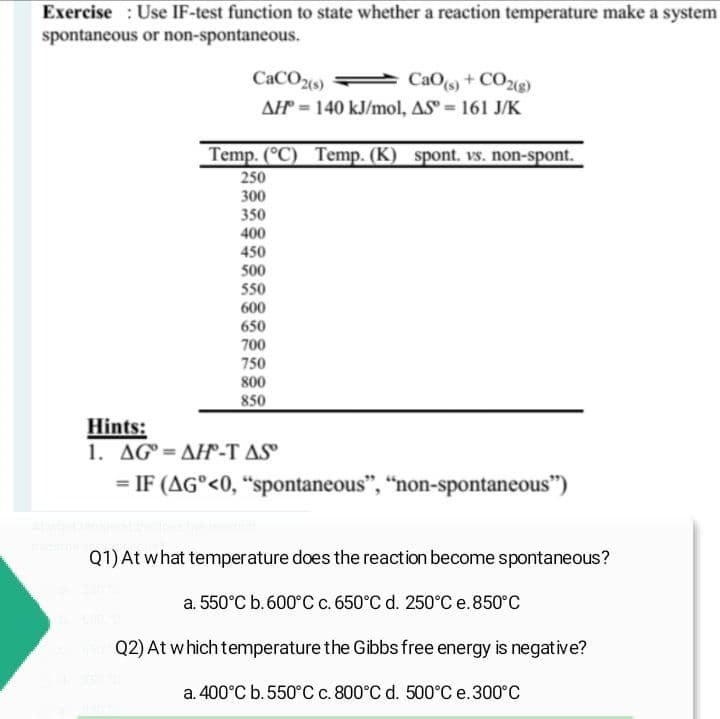Q1) At what temperature does the reaction become spontaneous? a. 550°C b. 600°C c. 650°C d. 250°C e. 850°C Q2) At which temperature the Gibbs free energy is negative? a. 400°C b. 550°C c. 800°C d. 500°C e. 300°C
Q1) At what temperature does the reaction become spontaneous? a. 550°C b. 600°C c. 650°C d. 250°C e. 850°C Q2) At which temperature the Gibbs free energy is negative? a. 400°C b. 550°C c. 800°C d. 500°C e. 300°C
Chemistry
10th Edition
ISBN:9781305957404
Author:Steven S. Zumdahl, Susan A. Zumdahl, Donald J. DeCoste
Publisher:Steven S. Zumdahl, Susan A. Zumdahl, Donald J. DeCoste
Chapter1: Chemical Foundations
Section: Chapter Questions
Problem 1RQ: Define and explain the differences between the following terms. a. law and theory b. theory and...
Related questions
Question

Transcribed Image Text:Exercise Use IF-test function to state whether a reaction temperature make a system
spontaneous or non-spontaneous.
CaCO2(s)
CaO(s)+CO2(g)
AH = 140 kJ/mol, AS = 161 J/K
Temp. (°C) Temp. (K) spont. vs. non-spont.
250
300
350
400
450
500
550
600
650
700
750
800
850
Hints:
1. AGAH-T AS
= IF (AG°<0, "spontaneous", "non-spontaneous")
Q1) At what temperature does the reaction become spontaneous?
a. 550°C b. 600°C c. 650°C d. 250°C e. 850°C
hap Q2) At which temperature the Gibbs free energy is negative?
a. 400°C b. 550°C c. 800°C d. 500°C e. 300°C
Expert Solution
This question has been solved!
Explore an expertly crafted, step-by-step solution for a thorough understanding of key concepts.
Step by step
Solved in 2 steps with 1 images

Knowledge Booster
Learn more about
Need a deep-dive on the concept behind this application? Look no further. Learn more about this topic, chemistry and related others by exploring similar questions and additional content below.Recommended textbooks for you

Chemistry
Chemistry
ISBN:
9781305957404
Author:
Steven S. Zumdahl, Susan A. Zumdahl, Donald J. DeCoste
Publisher:
Cengage Learning

Chemistry
Chemistry
ISBN:
9781259911156
Author:
Raymond Chang Dr., Jason Overby Professor
Publisher:
McGraw-Hill Education

Principles of Instrumental Analysis
Chemistry
ISBN:
9781305577213
Author:
Douglas A. Skoog, F. James Holler, Stanley R. Crouch
Publisher:
Cengage Learning

Chemistry
Chemistry
ISBN:
9781305957404
Author:
Steven S. Zumdahl, Susan A. Zumdahl, Donald J. DeCoste
Publisher:
Cengage Learning

Chemistry
Chemistry
ISBN:
9781259911156
Author:
Raymond Chang Dr., Jason Overby Professor
Publisher:
McGraw-Hill Education

Principles of Instrumental Analysis
Chemistry
ISBN:
9781305577213
Author:
Douglas A. Skoog, F. James Holler, Stanley R. Crouch
Publisher:
Cengage Learning

Organic Chemistry
Chemistry
ISBN:
9780078021558
Author:
Janice Gorzynski Smith Dr.
Publisher:
McGraw-Hill Education

Chemistry: Principles and Reactions
Chemistry
ISBN:
9781305079373
Author:
William L. Masterton, Cecile N. Hurley
Publisher:
Cengage Learning

Elementary Principles of Chemical Processes, Bind…
Chemistry
ISBN:
9781118431221
Author:
Richard M. Felder, Ronald W. Rousseau, Lisa G. Bullard
Publisher:
WILEY